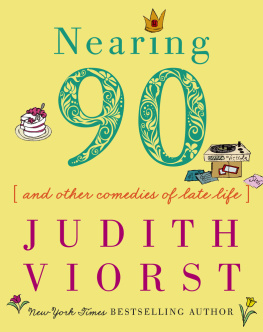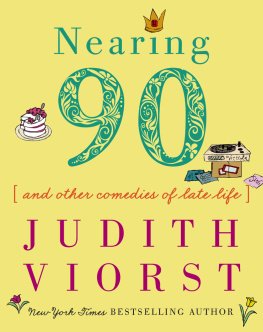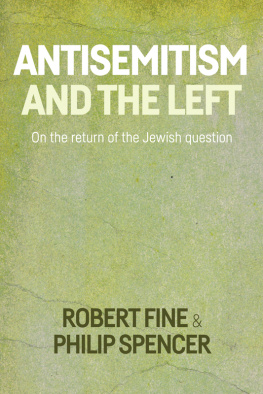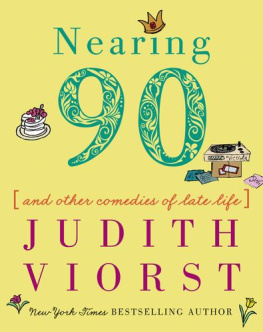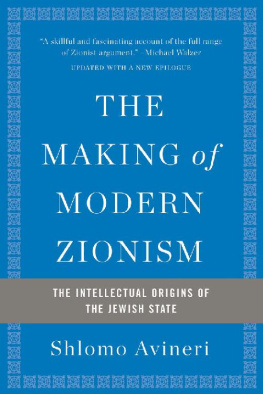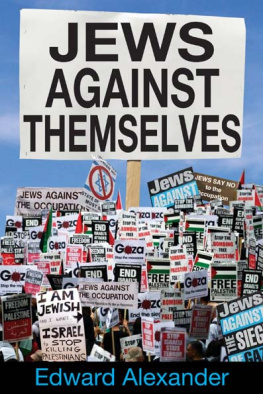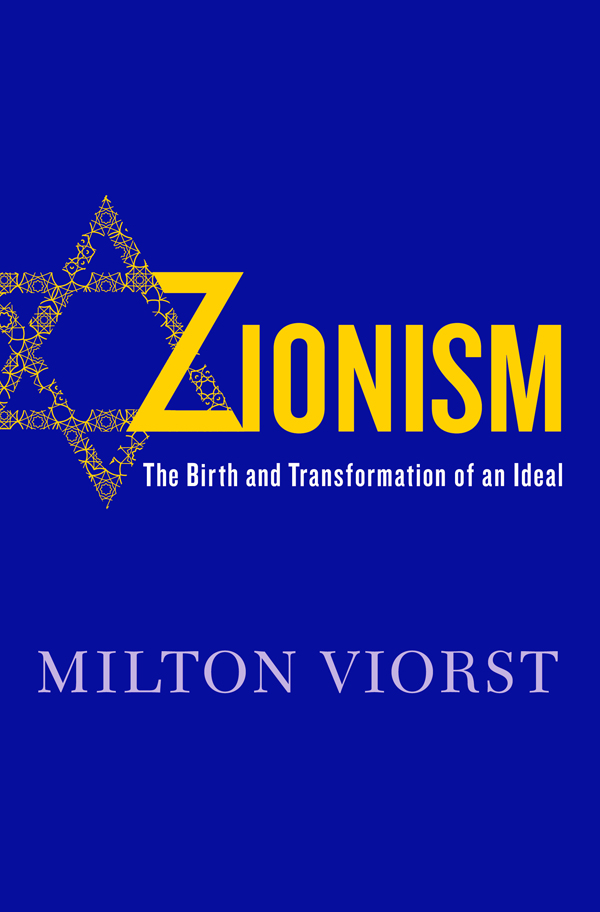Contents
Guide

The author and publisher have provided this e-book to you for your personal use only. You may not make this e-book publicly available in any way. Copyright infringement is against the law. If you believe the copy of this e-book you are reading infringes on the authors copyright, please notify the publisher at: us.macmillanusa.com/piracy.
To Rabbi Leonard Beerman
and the other peacemakers,
the greatest of the Zionists
I made my first visit to Israel a few months after the Six-Day War. I recall feeling very upset that virtually no one I met during the visit talked of Israels victory as an opening to a more stable Middle East, in which the Jews could live comfortably in peace. Instead, most exulted over the magnitude of the victory and Israels obvious military dominance in the region. The few Israelis who expressed concern about the collective intoxication produced by the victory seemed like spoilsports. This book has been gestating in my mind ever since.
I cannot claim that I was immune to the exultation. Until that visit, I had worked as a journalist in Washington, writing chiefly on American politics. Having come of age during the Holocaust, I had long taken pride in Zionisms success in providing a homeland for beleaguered Jews, especially Holocaust survivors. The outcome of the 1967 war imbued in me, as it did in most Jews, a sense of relief. It also established a renewed bond with my Jewish roots. The perils to the Jewish state clearly remained, but I was not then aware how much the Jews themselves would add to them.
As both a journalist and a Jew, I felt at home in Israel, and, over the decades, I returned on extended working visits at least a few times a year. I found Israelis full of ideasand more than willing to share them with me. I made Israeli friends. I also read Jewish history and explored Jewish thought. Sometimes I crossed into the West Bank and the Gaza Strip for talks with the local Arabs, who introduced me to their own perspective. It was clear in these years that the practices of Israels military occupation were harsh and growing harsher. I came to know more than a few Israelis who were troubled by the opportunities the state was squandering to advance peace.
In time, I broadened my perspective of the Middle East by making working trips to the Arab world. There was never a shortage of tumultuous events for a journalist to cover in the region: Arafat and the PLOs guerrilla warfare, a civil war in Lebanon, the murder of Anwar Sadat and later of Yitzhak Rabin, Iraqs bloody conflict with revolutionary Iran, rising Islamic radicalism, Saddam Husseins seizure of Kuwait and two American-led invasions to overturn his tyranny. Even as I worked among the Arabs, however, I looked over my shoulder at what was happeningor not happeningamong my fellow Jews in Israel.
As the years rolled by, I produced countless articles on assignment from newspapers and magazines, most combining interpretation with reporting. I also wrote op-eds and other opinion pieces in the Washington Post and the Washington Star , as well as in The New York Times . The French called my kind of work journalisme engag, which meant that my writing, without sacrificing accuracy, reflected a strong personal viewpoint. The core of this viewpointmore controversial than I had once imagined it would bewas that the interests of Israel, the Arabs, and the United States would all be served by putting an end to the obstacles to Middle East peace.
Having once trained for a university career, I subsequently rejected it in favor of the excitement of journalism. But I increasingly found myself gravitating toward longer works. My first book on the Middle East, published in 1987, was Sands of Sorrow, which examined the political divisions among Israelis, principally over the peace issue. I subsequently wrote several books on the Arabs and on Islam. In 2002, I did a follow-up book on Israel called What Shall I Do with This People?: Jews and the Fractious Politics of Judaism, focusing on the recurring schisms that occurred in Jewish history and how they mirrored Israel today.
The book I had not writtennor has anyone else, I daresaywas an exploration of the question that first upset me after the Six-Day War. How did Zionism, over the course of a century, evolve from the idealism of providing refuge for beleaguered Jews to a rationalization for the armys occupation of powerless Palestinians? In recent years, though Israel grew stronger and more prosperous as a nation, Zionism became increasingly defined by military power. Meanwhile, Israel, Zionisms offspring, lost much of the sympathy it had once enjoyed from the international community by oppressing the Palestinians under its control.
I began Zionism at a time when serious talk of Middle East peace had all but vanished from international discourse. Since then, the American government under President Obama has initiated two major negotiating effortsand failed dismally in both. Does Zionisms recent silence on the issue suggest that the Jewish DNA contains an immunity to peace? This book follows a steady transformation through the lives and thought of the men who were most influential in shaping Zionisms course. Scholars may disagree on the figures I have chosen and how I depict them. But it is beyond dispute that the history of Zionism is inseparable from ongoing conflict not just between Jews and their adversaries but between Jews and Jews.
The commitment to providing a homeland for a people once scattered across a hostile world represents the Zionist ideal. But Jews have been unable to overcome the obstacles to reuniting after nearly two millennia of living apart. Herzl, Zionisms founder, warned of the difficulty of achieving reconciliation among Jews. The Zionism we know today is not a unified idea but a composite of bitter rivalries between stubborn men and their visions of Jewish statehood. Zionism has created a successful country but it has not made the Jews more secure. The absence of peace, in my judgment, keeps the Zionist achievement in jeopardy.
Theodor Herzl is justly credited with being the founder of Zionism, the movement that in time led to the establishment of the Jewish state in Palestine. But Jewish nationalism, Zionisms foundation, appeared well before him. So did the first tentative Zionist organizations. By the time Herzl threw his prodigious energies into the cause, the seeds sown by dedicated men and women throughout Europe had already begun to bloom.
That is not to say that Zionism would have triumphed without Herzl. Herzl possessed a personal magic, which he brought to the historical stage at a fortuitous moment. The century that preceded him had produced a transformation of Europe and, no less important, of Europes Jews. The result was that in 1896, when Herzl published Der Judenstaat, Zionisms seminal tract, Jews throughout Europe and beyond were prepared to embrace his message.
Herzls program was a direct challenge to the rabbinic class that had governed the Jews since they were driven out of Palestine early in the first millennium A.D. The rabbis established a law code called halacha, which they shaped over subsequent centuries, drawing on rabbinic debates recorded in the Talmud. They also imbued the codes with divine authority, making them easier to enforce. Befitting a people in exile, halacha consisted preponderantly of guidance for softening the edges of a painful earthly existence. It is not far-fetched to assert that, even today, Exile is the foundation of rabbinic Judaism.


